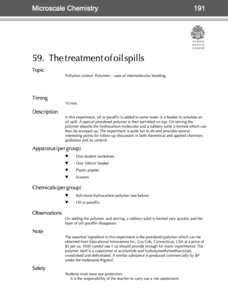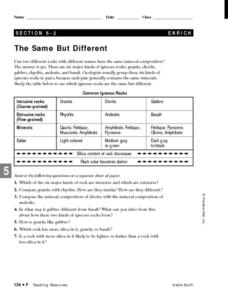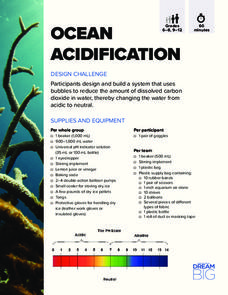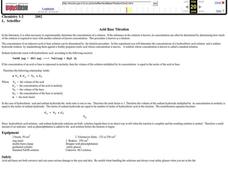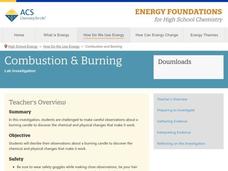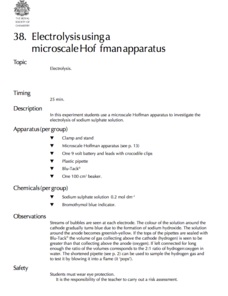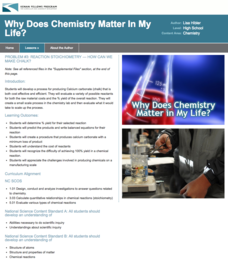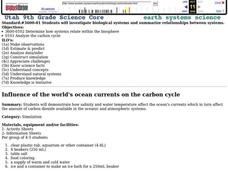Curated OER
Heating and Cooling Curves
Students experiment with a pure substance and a phase change. In this heating and cooling curves lesson plan, students study the effects of heating and cooling a pure substance to observe a phase change. They determine both the melting...
Virginia Department of Education
Molar Heat of Fusion for Water
How can you describe heat of fusion in a way the class understands and relates the importance of this concept to present day issues? In this third instructional activity of the series, learners conduct an experiment, demonstrating the...
Royal Society of Chemistry
The Treatment of Oil Spills—Microscale Chemistry
When oil spills happen, how is the oil cleaned up? Pupils of polymer science discover an amazing substance that turns oil into a solid during a microscale experiment. Individuals observe oil or paraffin before and after addition of the...
Nuffield Foundation
Investigating the Effect of Concentration of Blackcurrant Squash on Osmosis in Chipped Potatoes
Model and explore osmosis using squash and potatoes. Young scientists expose chunks of potatoes to different concentrations of a squash solution. They compare the weights of the chunks before and after exposure to the solution and use...
Curated OER
Digital Video Lesson Plan: Brine Shrimp
Students participate in classroom experiment to gain better understanding of type of environment brine shrimp can best survive. Students then explore effects of common saltwater pollutants on survival of animals in sea.
NEED Project
Calibrating Thermometers
Engage young scientists in the upper-elementary and middle school grades with this collection of simple experiments. Whether you're teaching about heat transfer, density, or potential energy this resource has a lab for you.
Curated OER
The Same, But Different
Third graders examine the phase change between solids and liquids and determine it to be a physical change. Ice is the perfect item to use to demonstrate this phase change. Pupils experiment with measuring and weighing solid ice and the...
It's About Time
States of Matter: Solid, Liquid, and Gas
Solid, liquid, and gas: they all matter. Scholars create an animation of the various states of matter, experiment with the temperature of water as it changes states, and observe carbon dioxide as it changes states. The lesson also...
Royal Society of Chemistry
A Microscale Acid-Base Titration
Watch as acids and bases put smiles on their faces. Young chemists learn the concept of acid-base titration firsthand in a microscale experiment. Working groups collaborate, titrate, then use their data to determine the concentration of...
Royal Society of Chemistry
A Cartesian Diver—Classic Chemistry Experiments
Sometimes the simplest experiments leave the biggest impression! Introduce young chemists to the Cartesian Diver by having them make one of their own. Use the Diver to further their study of liquids and gases, as well as compression.
DiscoverE
Ocean Acidification
Combat ocean acidification with bubbles. Young engineers create a system that reduces the acidity of water. Dry ice in water helps simulate ocean acidity, and blowing bubbles into the water results in a gas exchange that neutralizes the...
Texas State University
Earth: Deposition and Lithification
Geology geniuses analyze sediment samples with a hand lens and sort according to physical characteristics. They also learn about the processes of cementation, compaction, and lithification within the rock cycle. The lesson plan is...
Curated OER
What are Metamorphic Rocks and How are They Formed?
Even though the student handouts are not included in the write-up, this lesson plan contains the instructions for terrific activities to use when teaching middle schoolers about metamorphic rocks. First, they compare granite to gneiss...
Curated OER
Acid-Base Titration
Students determine the concentration of an acid using titration. In this acid-base titration lesson plan, students determine the concentration of an unknown hydrochloric acid solution using phenolphthalein as an indicator and a known...
Curated OER
WS 1.0 Math Skills Update
In this math skills worksheet, students solve a variety of basic math problems such as solving for "x" in different types of equations, manipulating algebraic expressions, converting from ordinary notation to scientific notation and...
Curated OER
Fuel Cell Experimentation
With rising oil prices and increasing concerns over global warming, the pressure is on for engineers to develop alternative sources of energy. Among the new technologies being developed are hydrogen fuel cells, which young scientists...
Teach Engineering
Pill Dissolving Demo
Plop, plop, fizz, fizz, oh that one is the fastest. The teacher demonstration is the second part of a four-part series. The class observes how different pill types dissolve in simulated stomach acid. They determine which one dissolves...
University of Washington
The Carbon Cycle
When it comes to the carbon cycle, the sky really is the limit. The lesson begins with observing a closed ecosystem in a bottle. Then, scholars discuss and answer questions on the carbon dioxide and oxygen cycles.
American Chemical Society
Combustion and Burning
On Earth, a candle flame points up, but on the International Space Station, it forms a sphere. Young scientists practice their skills by recording observations before, during, and after a candle burns. Chemical and physical changes...
Royal Society of Chemistry
A Giant Silver Mirror Experiment
Mirror, mirror, on the wall ... who's the best chemistry teacher of them all? You'll get the vote for certain after your class completes the Silver Mirror experiment! Partnered pupils use Tollen's reagent and glucose to silverplate a...
Royal Society of Chemistry
A Solid-Solid Reaction between Lead Nitrate and Potassium Iodide
Why is it so difficult to make two solid compounds react? Investigate the concepts of particle collisions and rate of reaction using a quick demonstration. The colorful experiment features two plain, white solids combining to form a...
Royal Society of Chemistry
Electrolysis Using a Microscale Hoffman Apparatus—Microscale Chemistry
Get big results out of a small-scale lab! Young chemists observe the electrolysis of sodium sulfate using a microscale experiment. A colorful indicator solution combined with the production of gas bubbles yields a variety of observations...
Kenan Fellows
Reaction Stoichiometry—How Can We Make Chalk?
What is a reasonable percent yield in the manufacturing process? Scholars develop a process for producing chalk in the third lesson of a six-part series. Then, they must determine the theoretical and percent yield. Discussions about...
Curated OER
Earth Systems
Ninth graders investigate biological systems. They summarize relationships between systems. Students determine how systems relate within the biosphere. They analyze the carbon cycle.




